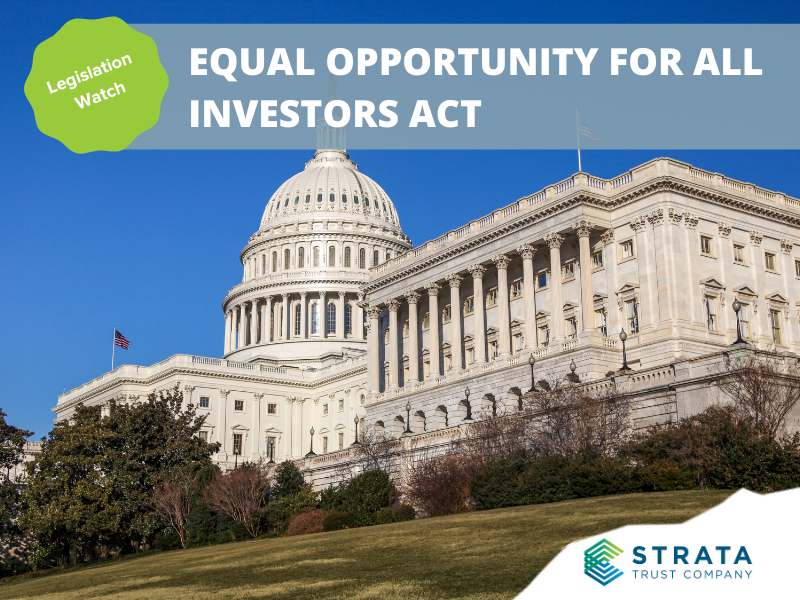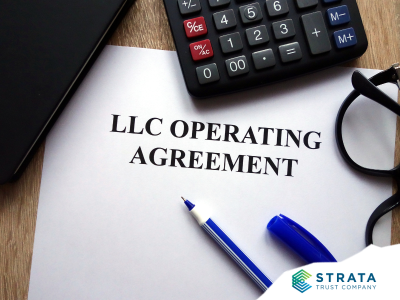The Equal Opportunity for All Investors Act of 2023 was proposed to expand the individuals eligible to invest in start-up companies and other private placements. The bill passed the U.S. House of Representatives on May 31, 2023 (383-18) and was received by the Senate for consideration on June 1, 2023.
Current Investment Restrictions for Private Placements
Self-directed IRA investors often have the expertise to assess complex alternative investments – but federal securities laws prohibit individuals who are not “accredited investors” from investing in new companies and other unregistered securities, including hedge funds, venture capital funds, and private equity funds. These types of investment offerings are not registered with the SEC, so they aren’t held to the agency’s standard for financial and regulatory disclosures. An accredited investor, however, is deemed to have sufficient expertise to understand the risks and merits of these types of investments and to have a reduced need for protection from risky or less-than-transparent financial transactions.
To be an accredited investor, an individual must meet a wealth or income threshold or have a demonstrated level of financial sophistication:
| Net worth over $1 million, excluding primary residence (individually or with spouse or partner) |
| Income over $200,000 (individually) or $300,000 (with spouse or partner) in each of the prior two years, and reasonably expect the same for the current year |
| Investment professionals in good standing holding the general securities representative license (Series 7), the investment adviser representative license (Series 65), or the private securities offerings representative license (Series 82) |
| Directors, executive officers, or general partners (GP) of the company selling the securities (or of a GP of that company) |
| Any “family client” of a “family office” that qualifies as an accredited investor |
| For investments in a private fund, “knowledgeable employees” of the fund |
Entities such as corporations, partnerships, LLCs, and trusts can also qualify as accredited investors if the entity owns investments in excess of $5 million, has assets in excess of $5 million, or is owned by all equity owners that are accredited investors.
Equal Opportunity for All Investors Act of 2023
The Equal Opportunity for All Investors Act of 2023 is a bipartisan bill to expand who may be considered an accredited investor based on their knowledge, instead of just their wealth. Legislators want to open the doors to investment opportunities for people who don’t already have significant wealth. This proposed law change would allow an individual to qualify as an accredited investor after passing an exam that is designed to ensure the individual has the financial expertise to appropriately assess the risks and merits associated with private offerings. The exam would be designed with an appropriate difficulty level such that an individual with financial sophistication or training would be unlikely to fail. It would have to include methods to determine whether an individual seeking to be certified as an accredited investor demonstrates competency with respect to:
- Different types of securities
- Disclosure requirements for issuers and private companies as compared to public companies
- Corporate governance
- Financial statements
- Aspects of unregistered securities, including risks associated with limited liquidity, limited disclosures, variance in valuation methods, longer investment horizons, and potential conflicts of interest for financial professionals
If the bill passes, the Securities and Exchange Commission (SEC) would have one year to develop the exam. Once the exam is ready, the Financial Industry Regulatory Authority (FINRA) would have 180 days to begin administering the exam, free of charge to the public.
Next Steps
The bill’s drafters believe that the definition of an accredited investor—and the related investment opportunities—should not be tied exclusively to wealth. This bill could unlock opportunities for knowledgeable investors no matter their account balance or level of income, as well as opportunities for advisors and investment sponsors working with private placement investments. Should the bill pass, advisors and investment sponsors will want to incorporate the new certification exam into their processes for working with accredited investors.
STRATA will keep an eye on the progress of the Equal Opportunity for All Investors Act and alert readers to any significant changes that may occur. If you have any questions or concerns, you may contact our self-directed IRA experts.















